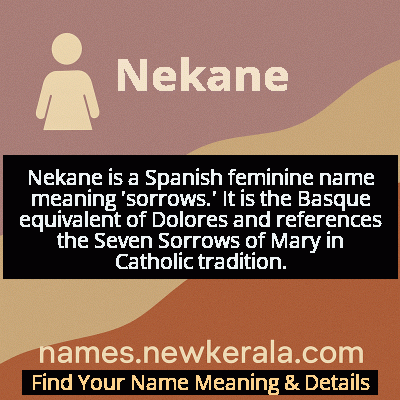Nekane Name Meaning & Details
Origin, Popularity, Numerology Analysis & Name Meaning of Nekane
Discover the origin, meaning, and cultural significance of the name NEKANE. Delve into its historical roots and explore the lasting impact it has had on communities and traditions.
Name
Nekane
Gender
Female
Origin
Spanish
Lucky Number
5
Meaning of the Name - Nekane
Nekane is a Spanish feminine name meaning 'sorrows.' It is the Basque equivalent of Dolores and references the Seven Sorrows of Mary in Catholic tradition.
Nekane - Complete Numerology Analysis
Your Numerology Number
Based on Pythagorean Numerology System
Ruling Planet
Mercury
Positive Nature
Adventurous, dynamic, curious, and social.
Negative Traits
Restless, impatient, inconsistent, prone to indulgence.
Lucky Colours
Green, white.
Lucky Days
Wednesday.
Lucky Stones
Emerald.
Harmony Numbers
1, 3, 9.
Best Suited Professions
Sales, marketing, travel, entertainment.
What People Like About You
Versatility, charisma, adventurous spirit.
Famous People Named Nekane
Nekane Díez
Footballer
Spanish professional footballer who played for Athletic Bilbao and the Spanish national team
Nekane Altzelai
Actress
Basque actress known for her work in Spanish television and theater productions
Nekane Balluerka
Psychologist and Academic
Professor and researcher at the University of the Basque Country, specializing in psychological measurement
Nekane Arroyo
Politician
Spanish politician who served as Deputy of the Basque Parliament
Name Variations & International Equivalents
Click on blue names to explore their detailed meanings. Gray names with will be available soon.
Cultural & Historical Significance
Throughout history, the name has been particularly popular in northern Spain, especially in the Basque Autonomous Community and Navarre, where it represents both religious piety and cultural pride. The name's endurance through various political and social changes demonstrates the resilience of Basque cultural identity within the broader Spanish context. During periods when the Basque language was suppressed, names like Nekane became subtle acts of cultural resistance and identity preservation. Today, the name continues to symbolize the unique intersection of Catholic tradition and Basque nationalism that characterizes much of the region's cultural landscape.
Extended Personality Analysis
Women named Nekane are often perceived as deeply empathetic and emotionally intuitive individuals. They tend to possess a natural understanding of human suffering and are frequently drawn to caring professions or roles where they can provide comfort and support to others. Their name's association with sorrows often translates into a personality marked by wisdom gained through overcoming challenges and a remarkable ability to find strength in difficult circumstances. Nekanes are typically known for their quiet resilience and inner strength.
They often exhibit a calm, steady presence that others find comforting during turbulent times. While they may appear reserved initially, they form deep, meaningful relationships and are fiercely loyal to those they care about. Their emotional depth allows them to be excellent listeners and trusted confidantes, though they may sometimes struggle with setting emotional boundaries due to their strong empathetic nature. Many Nekanes develop a philosophical outlook on life, finding beauty and meaning in both joy and sorrow, and they often serve as pillars of strength within their families and communities during difficult times.
Modern Usage & Popularity
In contemporary times, Nekane maintains moderate popularity primarily within the Basque Country and among Basque diaspora communities. While not among the most common names in Spain overall, it continues to be chosen by parents who wish to honor their Basque heritage and Catholic traditions. The name has seen some revival in recent years as part of a broader movement to preserve and celebrate Basque language and culture, with younger generations rediscovering traditional names as expressions of cultural identity. Its usage remains largely regional, with highest concentration in the Basque Autonomous Community, Navarre, and areas with significant Basque populations in France and the Americas. Modern parents who choose this name often appreciate its cultural significance and the strength implied by its meaning, seeing it as a name that prepares a child for life's challenges with grace and resilience while maintaining connection to ancestral roots.
Symbolic & Spiritual Meanings
Symbolically, Nekane represents the profound understanding that sorrow and suffering are integral parts of the human experience that can lead to wisdom, compassion, and spiritual growth. The name carries the metaphorical meaning of transforming pain into strength and empathy, much like the Virgin Mary's sorrows in Catholic tradition are seen as sources of spiritual power and intercession. It symbolizes emotional depth, resilience in adversity, and the capacity to find meaning in life's difficulties. The name also represents cultural endurance and identity preservation, serving as a linguistic bridge between religious tradition and ethnic heritage. In a broader sense, Nekane embodies the concept that true strength often emerges from navigating and understanding sorrow rather than avoiding it, and that the most compassionate individuals are often those who have themselves known suffering and transformed it into empathy for others.

